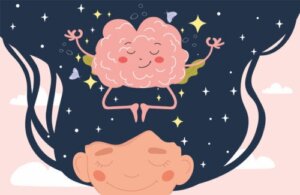World Mental Health Day


Written and verified by the psychologist Maria Fatima Seppi Vinuales
Why is it still so difficult for us to talk about our emotions and discomfort? Why is it that before going for a consultation with a mental health professional, we take a thousand detours? In many cases, talking about mental health is still taboo. Since October 10 was World Mental Health Day, let’s talk about it.
The slogan chosen for this year by the World Health Organization (WHO) was “Making mental health and well-being for all a global priority.” It seeks to highlight the impact that mental health has on people’s quality of life, as it clearly interferes with their well-being and development.
We think you may be interested in reading this, too: Psychobiome: How Do Microbes Influence Your Mental Health?
Why a World Mental Health Day?
The day warns about the need to allocate a budget to address mental health, with public policies and programs that focus on promotion and prevention. That’s why new measures are required that appeal to the creativity and commitment of professionals but also of the community in general.
This slogan is also very intentional. It invites us to remember that not all people have the resources to enjoy optimal mental health. Moreover, optimal mental health is a human right.
Difficulties in access, living conditions, conditioning factors, and social and cultural stereotypes act as obstacles when seeking help from a professional. This is whu millions of people, according to the latest study published by the WHO, suffer in silence.
On the other hand, it’s important to clarify that although there’s a “common basis” for mental health, it’s also a subjective experience. For example, the experience of suffering is not the same for everyone. That’s why we need to be respectful and validate the emotions that others feel.
Similarly, it’s important to broaden our horizens. Many people equate mental health with disorders or diseases. Thus, they underestimate discomfort and normalize situations that are no less complex but are no less significant or have no impact.
In this sense, just as the concept of health was rethought some time ago, mental health isn’t just about the absence of disease. It’s also well-being, self-esteem, and enjoyment.

How can we help make the importance of mental health more visible?
There are many ways to be aware of the importance of mental health in our lives and to help others do so, too. Some of them are the following.
Make mental health more visible
First of all, talk about it. Give it importance and a space of its own, just as we do with other aspects of our lives.
Encouraging people to express themselves and ask for help is a way of making mental health more commonplace and moving it away from the reductionist view that associates it with stigma, madness, confinement, or “the madhouse.”
Like this article? You may also like to read: How Reading Changes the Brain and Benefits Mental Health
Get active
Health must be understood as a whole. Therefore, we must preserve the mind and state of mind, as well as the body.
Physical activity, whatever our preference for it may be, allows us to have a moment of recreation and relaxation. At the same time, it produces the so-called wellness hormones.
Set aside space and time for self-care
It’s important that we have time and space to get to know ourselves and to rest. Sometimes we achieve this by taking refuge in a book; other times, it’s by leaving the cell phone on silent and disconnecting from its notifications.
Self-care also goes hand in hand with self-knowledge and turning our gaze inward. During this important time we dedicate to ourselves, we can also develop hobbies.
Avoid judgment
It’s critical to avoid judging both yourself and others. If you don’t know each person’s particular situation, avoid commenting on it.
Instead, show empathy and keep an open ear. Avoid labeling people as “psychotic” or “crazy” and instead recognize people who are experiencing the condition psychosis or people who are expeiricing panic attacks. Remember: it’s an experience and not a part of their identity.

We’re not just talking about mental illness on World Mental Health Day
Mental health should also be conceptualized from the positive and by taking into account the many resources ta=hat we have. It’s so much more than “not being ill.” It’s also not just about the obvious conditions, such as a panic attack or a psychotic breakdown.
Today, our mental health is threatened on a daily basis due to the particular conditions of each country, socioeconomic inequality, war, conflicts, and violence. On World Mental Health Day, we should know that it’s a permanent effort to ensure that all human beings have the conditions in which they can experience good mental health.
All people are vulnerable and have problems. It’s also important to highlight that therapy is not just for those with uncomfortable or noticeable problems but also for anyone who’s looking to improve their mental health. Therefore, we must provide resources and opportunities so that everyone can enjoy this basic human right.
All cited sources were thoroughly reviewed by our team to ensure their quality, reliability, currency, and validity. The bibliography of this article was considered reliable and of academic or scientific accuracy.
- Restrepo, D. A., & Jaramillo, J. C. (2012). Concepciones de salud mental en el campo de la salud pública. Revista Facultad Nacional de Salud Pública, 30(2), 202-211.
- Greco, C. (2010). Las emociones positivas: su importancia en el marco de la promoción de la salud mental en la infancia. Liberabit, 16(1), 81-93.
This text is provided for informational purposes only and does not replace consultation with a professional. If in doubt, consult your specialist.








